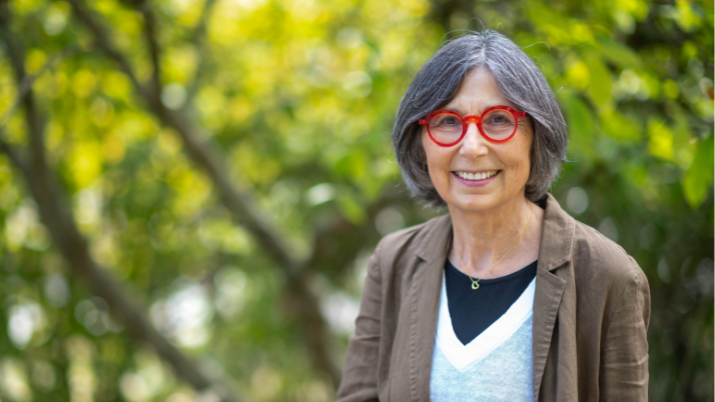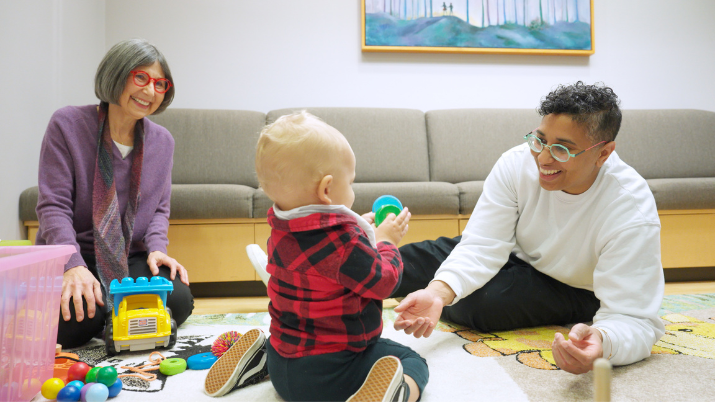

Image of Dr. Janet Werker
The article is republished from the University of British Columbia’s Faculty of Arts website. Read the original article.
Dr. Janet Werker, University Killam Professor and Canada Research Chair in the Department of Psychology, was selected for the 2024 Benjamin Franklin Institute Medal in Computer and Cognitive Science. This highly esteemed recognition of her prevailing research is presented by The Franklin Institute of Philadelphia.
This award is a testament to Dr. Werker’s lifelong dedication and the far-reaching influence of her research in the field of language acquisition, particularly in infants. Dr. Werker says “Language acquisition begins long before the first word is spoken, as infants listen to the language used around them and interact in face-to-face communication with their caregivers. Talking to babies in an engaging and turn-taking fashion supports language acquisition, while also helping to establish that essential parent-infant relationship.”
To commemorate this milestone, Dr. Werker shares with us her excitement for the achievement, sources of inspiration, and offers advice for aspiring researchers.
Can you briefly describe your research or area of focus as it relates to your Franklin Institute award?
My research focuses on the perceptual foundations of language acquisition in early infancy, and how those relate to later word learning. In particular, I try to understand the kinds of perceptual and conceptual biases infants have at birth that support language acquisition, how those are changed and sculpted by specific experience with one language or another, and whether the timing of change is constrained by brain and biological maturation. We study infants growing up monolingual in different languages, as well as infants growing up learning two or more languages from birth. We use both behavioral and neuroimaging tasks to try to understand the infant mind/brain.
Who inspired you to pursue your area of expertise?
My interest was first inspired by reading the ethologists (those who study animals in their natural environments) as a teenager. My undergraduate developmental psychology professor at Harvard, Jerome Kagan, kindled my interest in human development.
My MA/PhD supervisor at UBC, Richard Tees in Psychology, inspired and supported my interest in perceptual development within a critical period framework, and taught me the value of using animal models to understand human development. Another inspiring and important mentor at UBC was John Gilbert, from SASS, who took me through the literature on infant speech perception, and provided the first space for me to conduct studies.
The Director of Haskins Laboratories in New Haven, Massachusetts, Al Liberman, was another inspiring mentor. He introduced me more deeply to the mysteries of speech perception and shared my research findings to the broader academic community, thus linking me to researchers far and wide. Rachel Clifton (now Rachel Keen) at U Mass, provided a supportive (but with high standards) model of how to navigate being a woman in academia.
“I have always been interested in trying to understand the capabilities that are unique to humans, and complex language is our quintessential human trait. Thus, seeking to better understand the biases we have at birth for language learning, and how those change with experience and development became an early—and lasting—passion.”


The image was provided by The Franklin Institute of Philadelphia.
Could you share a surprising discovery from your research that challenged conventional wisdom in the field and led a shift in your perspective?
The most surprising aspect of my infant cross-language speech perception research was that optimal development can sometimes involve a decline rather than an improvement in an underlying ability. Most specifically, we showed that infants are born sensitive to even non-native, and never before heard speech sounds, but that as they become experienced listening to the native language, they show a decline in their ability to discriminate non-native speech sounds. This in turn makes them better prepared to listen appropriately to the speech sounds used to distinguish words in their native language, and makes them better word learners.
Following this discovery, there was a paradigm shift to looking in young infants for sensitivity to other properties of language that might begin as more universal, and be trimmed down to just native-language sensitivities with experience. It generalized beyond language to other perceptual attributes, including musical scales, familiar vs. unfamiliar ethnicities, visual properties such as tight- vs. loose-fit and more.
As an accomplished researcher in linguistics and language acquisition, what emerging trends in your field do you find most promising for future breakthroughs?
There are several exciting trends.
- The inclusion of understudied languages. Most of our knowledge has come from studying English or one of the other dominant languages of the world, but to fully understand language acquisition, we need to study children acquiring more languages in different types of settings.
- An increased use of neuroimaging and electrophysiological tools in new ways and with new analysis techniques—including AI and other machine learning techniques—to help clarify the process of language development, and how it differs in children from different environments.
- The study of the foundations of language acquisition not only in the lab, but the “wild.” That is, in the home and other more naturalistic settings, in parent-child interactions, etc.
If you could collaborate with any scientist, living or historical, on a speech perception project, who would it be and why?
I’ve been fortunate to collaborate broadly across my academic career, and have learned from each of the collaborations. One person I learned from, and who really established the modern field of speech perception, was Al Liberman. While he was an important mentor, we never got to collaborate as he died fairly suddenly while still in his early 70’s. Although I never agreed with it entirely, his “motor theory of speech perception” was—and continues to be—very influential to my thinking. He was just starting brain imaging work looking at activation of the motor cortex in adults during speech perception when he died. Depending on what he might have found, it would have been fun to design infant studies together.
What advice would you give to aspiring psychologists or researchers, especially those interested in linguistics and language acquisition?
I would give the same advice to aspiring researchers in any area:
- Follow your passions; learn the theory, literature, research methods, and techniques you need to pursue the research questions that fascinate you.
- Find yourself a teacher(s); someone you can really learn from, seek advice, and critical feedback.
- Know that you can’t do this alone; teamwork, mentoring, and genuinely respectful communication are crucial.


